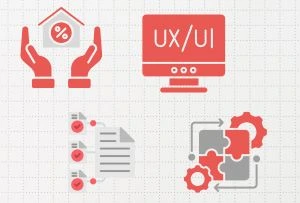Experion Technologies empowers financial institutions with innovative, secure, and scalable mortgage software development solutions that transform lending processes and deliver measurable business outcomes.
Technology is reshaping the mortgage industry at every stage of the lending lifecycle. From digital loan origination and automated underwriting to borrower self-service portals, software is now the driving force behind faster approvals, stricter compliance, and improved transparency. By investing in custom mortgage software development, lenders and brokers can streamline operations, reduce errors, and create borrower experiences that are seamless and trustworthy.
Forward-looking institutions are increasingly turning to custom mortgage software development services to differentiate themselves in a competitive landscape shaped by FinTech challengers and evolving regulations. Through secure, cloud-ready, and user-friendly platforms, mortgage & lending software development is enabling organizations to achieve agility, compliance, and sustained growth in today’s digital-first financial ecosystem.
What is Mortgage Software?

Mortgage software development focuses on building technology platforms that manage the entire loan lifecycle. These platforms handle everything from origination and underwriting to approval, servicing, and compliance reporting. The purpose of mortgage software is to simplify processes for lenders and brokers while giving borrowers faster, more transparent, and more secure access to credit.
By adopting custom mortgage software development, financial institutions can eliminate manual inefficiencies, improve accuracy, and enhance borrower engagement. Unlike off-the-shelf solutions, tailored platforms are designed to align with unique workflows and compliance requirements, making them a powerful tool for sustainable growth in the lending sector.
Different Types of Mortgage Software
- Loan Origination Systems (LOS): Automate loan applications, eligibility checks, and initial assessments.
- Underwriting and Risk Management Platforms: Analyze borrower creditworthiness and minimize default risks.
- Borrower-Facing Portals and Mobile Apps: Provide self-service capabilities for application tracking and document uploads.
- Document Management and E-Signature Systems: Replace paperwork with secure digital documentation and signatures.
- Mortgage Servicing and Repayment Platforms: Manage ongoing repayments, escrow, and account servicing.
- Compliance and Audit Management Solutions: Ensure alignment with regulations and maintain audit-ready records.
Each of these software types plays a critical role in the larger ecosystem of mortgage and lending software development, enabling organizations to deliver more efficient, compliant, and customer-friendly services.
Future-proof your lending journey
Partner with Experion for custom mortgage software development
Market Landscape & Current Trends
Growth of Digital Mortgage Platforms and FinTech Competition
The rise of FinTech companies has transformed borrower expectations. Customers now seek digital-first experiences that are fast, transparent, and mobile-friendly. To remain competitive, traditional banks and lending institutions are increasingly investing in custom mortgage software development services that replicate the agility and speed of FinTech platforms while maintaining the reliability of established financial institutions.
Regulatory Changes Influencing Software Requirements
The mortgage sector is heavily regulated, with frameworks such as CFPB, RESPA, and GDPR shaping operational practices. Evolving compliance rules demand software that can embed regulatory checks into workflows, automatically generate audit-ready reports, and adapt quickly to new legal requirements. Custom mortgage software development allows lenders to integrate compliance features directly into their platforms, reducing risk and ensuring accountability.
Rise of AI, Automation, and Cloud Computing in Lending
Modern lending software development services leverage advanced technologies to transform core processes. AI and automation are enhancing credit scoring, fraud detection, and underwriting accuracy, while cloud-based architectures ensure scalability, security, and cost efficiency. By combining these technologies within lending software development, institutions are not only improving efficiency but also future-proofing their platforms for evolving borrower expectations and market needs.
Core Features of Modern Mortgage Software
 Modern mortgage software development focuses on creating platforms that are comprehensive, secure, and user-friendly. A successful solution integrates multiple capabilities that simplify workflows for lenders while improving transparency and convenience for borrowers.
Modern mortgage software development focuses on creating platforms that are comprehensive, secure, and user-friendly. A successful solution integrates multiple capabilities that simplify workflows for lenders while improving transparency and convenience for borrowers.
- Loan Origination, Underwriting, and Approval Workflows: Automates the entire process from application intake to final loan approval, reducing turnaround times and eliminating repetitive manual tasks.
- Document Management Systems with E-Signatures: Enables secure digital storage of borrower documents and supports electronic signatures, minimizing paperwork while ensuring compliance.
- Integrated CRM for Customer Lifecycle Management: Provides lenders and brokers with a unified view of customer data to improve engagement and build stronger relationships.
- Compliance, Risk Management, and Audit Trails: Incorporates built-in checks to align with CFPB, RESPA, GDPR, and other regulations while generating audit-ready records.
- Third-Party Integrations: Connects seamlessly with banking systems, credit bureaus, and payment providers, creating a smooth end-to-end lending process.
- Advanced Analytics Dashboards and Reporting Tools: Delivers real-time insights into borrower behavior, loan performance, and portfolio risks to enable data-driven decision-making.
- Omnichannel Borrower Experiences Across Web and Mobile: Ensures accessibility for borrowers on any device, offering flexibility and convenience at every stage.
- User-Friendly UI/UX for Greater Adoption: Simplifies navigation for both staff and borrowers, reducing training requirements and improving overall adoption.
By embedding these features, custom mortgage software development services ensure institutions deliver efficiency, compliance, and superior borrower experiences.
The Benefits: Why Go Digital?
Digitizing mortgage operations through mortgage & lending software development creates tangible advantages for both financial institutions and their customers.
For Lenders and Brokers
- Faster Loan Origination and Approvals: Automated workflows reduce bottlenecks and speed up decision-making.
- Improved Accuracy and Reduced Risk of Errors: System-driven validations and automated data entry reduce human error.
- Automated Compliance and Risk Monitoring: Built-in compliance checks keep processes aligned with evolving regulations.
- Significant Cost Savings Through Streamlined Processes: Automation lowers operational costs and improves overall efficiency.
For Borrowers
- Seamless and Transparent Application Experiences: Borrowers can apply, upload documents, and track progress online.
- Real-Time Updates on Loan Status: Applicants receive instant notifications, reducing uncertainty and increasing trust.
- Faster Closing Times and Improved Trust: Digital processes shorten timelines, enhancing borrower satisfaction and confidence.
By leveraging custom mortgage software development, financial institutions can deliver exceptional value on both sides of the lending equation, strengthening competitiveness in a market shaped by speed, compliance, and customer-centricity.
Key Challenges in Mortgage Software Development
While the advantages of mortgage software development are significant, financial institutions often face hurdles in the design and implementation process. Recognizing these challenges is the first step toward building sustainable, future-ready solutions.
- Navigating Complex and Evolving Regulations: Mortgage firms must adhere to laws such as CFPB, RESPA, and GDPR. Regulatory shifts require continuous updates, and compliance features must be embedded directly into workflows.
- Safeguarding Sensitive Borrower and Financial Data: With rising cyber threats, protecting personal and financial information is paramount. Strong data encryption, role-based permissions, and secure cloud architectures are essential.
- Integrating with Legacy Systems: Many lenders still rely on older infrastructure. Developing software that integrates with these systems while enabling digital innovation is a key challenge for lending software development services.
- Managing Cost and Development Timelines: Enterprise-scale projects demand significant investment. Balancing budgets, timelines, and expectations requires an experienced mortgage & lending software development partner.
Custom Mortgage Software Development
 Generic, off-the-shelf tools often cannot keep up with the complexity of modern lending. Custom mortgage software development ensures platforms are designed around specific business goals, borrower expectations, and compliance obligations.
Generic, off-the-shelf tools often cannot keep up with the complexity of modern lending. Custom mortgage software development ensures platforms are designed around specific business goals, borrower expectations, and compliance obligations.
Advantages of a Tailored Platform
- Scales with Loan Volumes and Growth: Supports increasing transaction volumes without sacrificing performance.
- Adapts to Unique Workflows and Underwriting Models: Customized to match lending policies, credit scoring methods, and risk assessment processes.
- Seamless Integrations with Internal and Third-Party Systems: Bridges gaps with credit bureaus, payment gateways, banking systems, and existing enterprise tools.
Steps in Building Custom Solutions
- Discovery and Requirements Gathering: Identifying core needs, compliance priorities, and user expectations.
- System Architecture and Technology Selection: Choosing cloud providers, databases, and frameworks for scalability and security.
- Development and Integration: Building core modules and ensuring smooth connectivity with existing systems.
- Testing for Performance, Compliance, and Scalability: Validating speed, accuracy, and adherence to regulations.
- Deployment and End-User Training: Launching the platform with proper onboarding to ensure adoption.
By investing in custom mortgage software development services, lenders and brokers gain long-term flexibility, scalability, and control that generic platforms cannot provide.
Mortgage & Lending Software Development
While mortgage software solutions are tailored specifically for home loans, mortgage & lending software development encompasses a wider range of financial products, including personal loans, refinancing, and commercial mortgages. Building flexible platforms that support multiple lending products requires a thoughtful approach to scalability, compliance, and customer experience.
Common Modules
- Credit Scoring Engines: Automate borrower evaluations using credit bureau data and predictive analytics.
- Integrated Payment Gateways: Enable secure and seamless payment processing for loan repayments.
- CRM for Customer Relationships: Manage borrower interactions, improve engagement, and strengthen retention.
Best Practices for Multi-Product Lending Platforms
- Unified Dashboards: Provide a single view for managing multiple loan types, reducing complexity for staff.
- Consistent Security Policies: Apply standardized protocols for data protection across different products.
- Scalable Architectures: Design systems that can handle growing transaction volumes and adapt to new product offerings.
Experion Technologies specializes in both mortgage and lending software development, offering secure, compliant, and scalable platforms that support diverse loan products while ensuring regulatory alignment and superior user experiences.
Accelerate your lending transformation with Experion’s custom-built mortgage software solutions
The Mortgage Software Development Process: From Idea to Launch

Delivering effective custom mortgage software development services requires a clear, structured approach. Each stage ensures that the final product aligns with business needs, regulatory requirements, and borrower expectations.
- Discovery Phase
Collaborative workshops and in-depth analysis with stakeholders to define project objectives, compliance needs, and borrower-centric goals.
- Technology Stack & Architecture Considerations
Designing cloud-first infrastructure with API-based integrations for banking systems, credit bureaus, and third-party services. Prioritizing mobile-first responsive design to ensure accessibility across devices.
- Design and Prototyping
Developing wireframes and interactive prototypes to validate workflows, borrower journeys, and user experience before coding begins.
- Development and Testing
Using agile sprints for faster delivery, continuous testing to ensure performance, and robust migration strategies to transition from legacy systems without disruption.
- Deployment and Maintenance
Rolling out the solution in real-world environments, training staff for adoption, providing technical support, and delivering ongoing upgrades to maintain compliance, scalability, and innovation.
By following this structured process, organizations investing in mortgage & lending software development can launch future-ready platforms that streamline operations, reduce risks, and improve borrower satisfaction.
Compliance and Regulatory Essentials
Compliance is at the heart of mortgage software development. Lenders operate in an environment governed by strict rules and frequent regulatory updates. A robust software platform not only supports lending operations but also ensures that compliance obligations are met seamlessly.
Key Regulations
Mortgage platforms must align with a range of global and regional regulations, including:
- CFPB (Consumer Financial Protection Bureau): Protects borrowers by enforcing fair lending practices.
- RESPA (Real Estate Settlement Procedures Act): Governs the mortgage settlement process to ensure transparency.
- GDPR (General Data Protection Regulation): Requires strict protection and privacy measures for customer data, particularly in international operations.
- Industry-Specific Rules: Sectoral compliance frameworks such as SOX in finance or HIPAA when mortgages intersect with healthcare data.
Automating Compliance
Modern custom mortgage software development services embed compliance into everyday workflows. Automated checks flag discrepancies, while audit logs provide a transparent record of all transactions. The ability to generate compliance-ready reports reduces the administrative burden and minimizes risks of penalties or oversight.
Security and Data Protection
Protecting sensitive borrower and financial data is non-negotiable. Best practices in mortgage & lending software development include:
- Role-Based Access Controls: Ensuring users only access information relevant to their role.
- Data Encryption for Storage and Transfer: Safeguarding data integrity across systems.
- Secure Cloud Infrastructure with Monitoring: Providing a resilient and monitored environment for large-scale mortgage operations.
Cost Factors and ROI
 The cost of building a mortgage platform varies depending on scope, complexity, and integrations. Understanding these factors helps organizations plan strategically for custom mortgage software development and anticipate long-term value.
The cost of building a mortgage platform varies depending on scope, complexity, and integrations. Understanding these factors helps organizations plan strategically for custom mortgage software development and anticipate long-term value.
Variables Affecting Development Cost
- Scope and Complexity of Features: Advanced functionality such as AI-driven underwriting or real-time credit bureau integrations increase development effort.
- Required Integrations with Third-Party Systems: Connecting with banking systems, credit scoring platforms, and payment gateways adds to cost and complexity.
- Scalability Requirements and User Base Size: Enterprise-grade solutions for thousands of users require more robust infrastructure.
- Development Partner Expertise and Geography: Choosing a seasoned custom mortgage software development company ensures quality but may also influence pricing depending on location.
Measuring ROI
Despite higher upfront costs, lending software development services deliver significant long-term returns:
- Reduced Loan Processing Time: Automation accelerates origination, underwriting, and approvals.
- Lower Error and Compliance Costs: Automated workflows minimize human errors and reduce compliance risks.
- Increased Borrower Satisfaction and Retention: Faster closings, transparency, and improved customer experiences strengthen long-term loyalty.
By carefully evaluating both costs and ROI, lenders can justify investments in custom mortgage software development as a strategy for long-term growth, compliance, and customer trust.
Future Outlook

The future of mortgage software development is being shaped by disruptive technologies that will redefine efficiency, compliance, and customer experience in lending. Financial institutions that embrace these innovations early will be better positioned to compete in a fast-changing market.
- AI and Machine Learning for Predictive Underwriting and Risk Analysis: Intelligent algorithms will evaluate borrower data more accurately, reducing default risks and improving loan approval timelines.
- Blockchain for Digital Identity, Smart Contracts, and Secure Loan Records: Distributed ledgers will provide tamper-proof identity verification, automated contract execution, and enhanced transparency in mortgage transactions.
- Embedded Finance and Real-Time Approvals in Partner Ecosystems: Mortgage and lending software development services will increasingly integrate with partner platforms, offering borrowers instant approvals and seamless financial experiences.
These advancements highlight why custom mortgage software development must remain adaptable and future-ready, capable of integrating emerging technologies without disrupting ongoing operations.
Efficiency. Compliance. Growth.
Let Experion build the mortgage platform your business deserves
How Experion Can Support in Mortgage Software Development?
 Experion Technologies specializes in delivering custom mortgage software development services that combine innovation, compliance expertise, and user-first design. We help financial institutions build platforms that are secure, scalable, and aligned with regulatory requirements.
Experion Technologies specializes in delivering custom mortgage software development services that combine innovation, compliance expertise, and user-first design. We help financial institutions build platforms that are secure, scalable, and aligned with regulatory requirements.
Our expertise spans the full spectrum of mortgage & lending software development, from loan origination systems and underwriting platforms to borrower-facing portals and compliance management tools. By blending deep domain knowledge with cutting-edge technologies such as AI, cloud, and blockchain, we create solutions that not only solve today’s challenges but also prepare lenders and brokers for tomorrow’s opportunities.
Experion’s approach to custom mortgage software development ensures measurable business outcomes, whether it is reducing loan processing times, enhancing borrower engagement, or strengthening compliance frameworks. With our support, financial institutions can confidently navigate the complexities of digital transformation and deliver superior lending experiences.
Case Study: Transforming Mortgage and Lending with a Digital Origination Platform
About the Project
A leading US-based non-banking financial company providing both mortgage and non-mortgage lending products was struggling with inefficiencies caused by outdated legacy systems. Their existing desktop-based mortgage servicing platform was costly to maintain, lacked scalability, and failed to support evolving business needs. The institution required a future-ready solution to streamline loan origination, underwriting, servicing, and compliance while ensuring zero downtime during migration.
Challenges
- Legacy systems created operational inefficiencies and customer dissatisfaction.
- Multiple disconnected mortgage platforms made data management complex.
- Lack of scalability limited the ability to support growing loan volumes.
- Rising costs during the pandemic highlighted inefficiencies in the legacy servicing platform.
Experion’s Approach
Experion applied its expertise in custom mortgage software development services to reimagine the client’s lending ecosystem. The team:
- Conducted a full system assessment to identify vulnerabilities and inefficiencies.
- Designed a strategic roadmap for upgrading to a modern, scalable architecture.
- Developed a digital mortgage platform integrating origination, underwriting, compliance, and servicing.
- Leveraged reusable frameworks, rapid prototyping, and behavior-driven development to accelerate delivery.
- Ensured seamless integration with existing enterprise systems and third-party services.
Outcomes Delivered
The new platform offered a future-ready foundation for mortgage & lending software development, delivering measurable business results:
- 10% improvement in loan processing time through automation.
- 20% reduction in task duplication, boosting staff productivity.
- Optimized document compression reduced network usage by 32%.
- Real-time data synchronization reduced risk analysis time by 8% to 11%.
- Improved compliance, security, and audit readiness.
- Seamless borrower experiences through digital portals and omnichannel support.
Why It Matters?
This project demonstrates how custom mortgage software development can modernize complex lending operations. By addressing inefficiencies, embedding compliance, and scaling for growth, the client transformed its mortgage servicing into a secure, agile, and customer-centric platform.
Conclusion
Mortgage software development is reshaping the lending industry by creating platforms that enhance efficiency, strengthen compliance, and deliver superior borrower experiences. In a competitive financial landscape, businesses that invest in tailored platforms are better positioned to scale, innovate, and thrive in a digital-first world. By embracing custom mortgage software development services, institutions gain the flexibility to adapt to regulatory changes, harness emerging technologies, and meet evolving customer expectations.
Key Takeaways
- Custom mortgage software development ensures scalability, security, and alignment with unique workflows.
- Mortgage & lending software development supports diverse products such as personal loans, refinancing, and commercial mortgages.
- Emerging technologies like AI, blockchain, and cloud computing are transforming credit scoring, risk management, and compliance.
- Custom mortgage software development services improve accuracy, reduce risk, and accelerate loan processing.
- Seamless third-party integrations with credit bureaus, banking systems, and payment providers enhance operational efficiency.
- Lending software development services create borrower-friendly digital portals that improve transparency and trust.
- Long-term ROI is achieved through reduced processing time, lower compliance costs, and improved borrower satisfaction.
- Regulatory compliance is embedded through automated workflows, real-time reporting, and secure data management.
- Scalability ensures platforms grow with the business, adapting to rising loan volumes and new product lines.
- Experion Technologies partners with global financial institutions to deliver secure, future-ready platforms that accelerate lending transformation and drive measurable business impact.
At Experion Technologies, we combine domain expertise with cutting-edge innovation to deliver custom mortgage software development solutions that are secure, compliant, and scalable. Our approach integrates AI, cloud, blockchain, and analytics into lending platforms that not only solve today’s challenges but also prepare institutions for tomorrow’s opportunities. Whether it is mortgage origination, underwriting, compliance, or servicing, Experion provides end-to-end mortgage & lending software development services that deliver efficiency, agility, and growth.
Ready to redefine your lending journey?
Partner with Experion Technologies and unlock the power of future-ready mortgage and lending solutions built around your unique needs.

